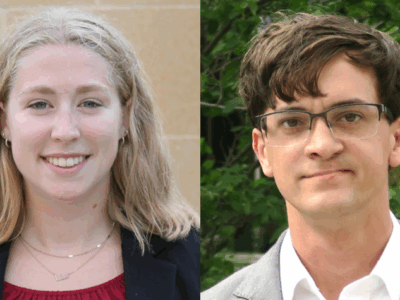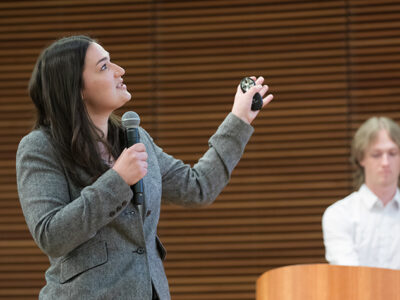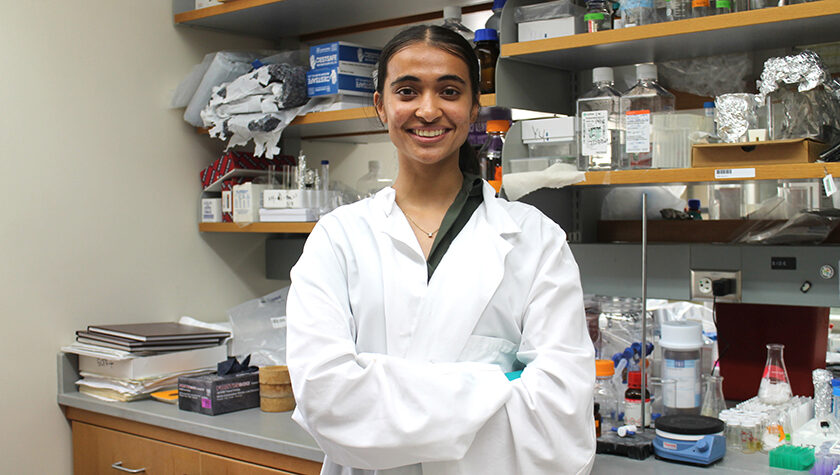
5
September

PharmTox student Samira Pal is honored with the AFPE Gateway to Research Award for her outstanding work in immunotherapy research
By Logan Underwood
When Samira Pal first arrived at the Cell Inspired Personalized Therapeutic (CIPT) lab at the University of Wisconsin–Madison School of Pharmacy during the fall of her freshman year, she hardly knew how to use a pipette. Almost three years later, she is one of the leading student researchers in the CIPT lab’s efforts to harness immunotherapy to fight cancer.
Pal, now a senior in the School of Pharmacy’s Pharmacology and Toxicology (PharmTox) program, has recently been recognized for her commitment and creativity in research with an American Foundation for Pharmaceutical Education’s (AFPE) Gateway to Research Award.
“Samira is a really talented and hard-working undergraduate student who loves research and has contributed a lot to our lab,” says Quanyin Hu, assistant professor in the School’s Pharmaceutical Sciences Division who runs the CIPT Lab. “We are proud of her being selected for the Gateway to Research Award. This is a well-deserved recognition for Samira’s accomplishments.”
“I know how many hours I put into my project, but to get to see the physical display of the research that we’ve done is really exciting.”
—Samira Pal
This national award, which provides a $5,000 stipend to exemplary bachelor’s and PharmD students enrolled in a pharmacy school, seeks to help students understand the value of research and communication as a way of improving their clinical skills.
This honor came shortly after Pal won a renowned UW–Madison Hilldale Undergraduate/Faculty Fellowship, which provides Pal with further support, training, and funding for her research. For Pal, receiving the Gateway to Research recognition came as a shock.
“We were just so surprised,” says Pal. “It’s really good to feel like what I’m doing day-to-day is valuable.”
Engineered immunotherapy
Hu’s CIPT lab focuses on the combination of cell therapy, immunotherapy, and personalized therapy to help treat disease. For Pal’s current project, she is delving into how immunotherapy can help patients battle cancer.
“In our lab, we specialize in creating a personalized immunotherapeutic approach to treating cancer,” says Pal. “That means that we use the patient’s own immune system as a way to target and kill the disease.”
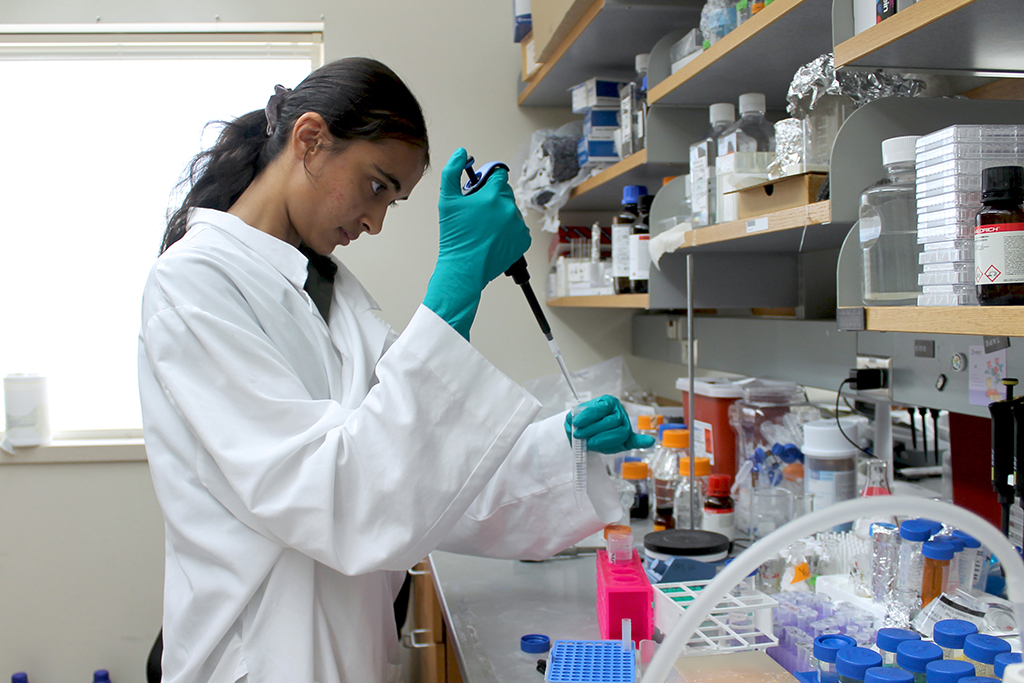
Specifically, Pal is researching how platelets might hold the key to making immunotherapy more effective. Platelets, which are created in our bone marrow, are disk-shaped cells that help form clots and stop bleeding. The lab is now researching ways to engineer platelets with nanoparticles to help treat breast cancer. These engineered platelets would then be loaded with helpful, cancer-fighting drugs and be deposited back into the patient’s body through an IV.
Day-to-day, Pal splits her time between in vitro and in vivo research. Her in vitro work consists of engineering the platelets, working with cells, and creating drug compounds. On the in vivo side, Pal also works with animal models to test the validity of their manufactured drugs and engineered platelets.
Right now, Pal is focused on working with proteins and readying platelets for the next stage of testing, which involves perfecting the nanoparticle-engineering process.
As part of her Hilldale Fellowship, Pal is ecstatic to present her research at the Undergraduate Research Symposium with her labmates in April.
“I know how many hours I put into my project, but to get to see the physical display of the research that we’ve done is really exciting,” says Pal.
A future in pharmacy
Pal’s work in the CIPT lab not only contributes to vital research but also grants her an opportunity to understand the fundamentals of how drugs work in the human body. While in the midst of applying for pharmacy school, Pal is grateful for the preparation and hands-on experience that the CIPT lab has given her.
Pal believes that learning about the fundamentals of drugs is vital in helping her achieve her goal of becoming a clinical pharmacist.
“Something that is really going to help me is understanding the mechanisms of these drugs,” says Pal. “To understand how they work, why they work, and sometimes why they don’t work will serve me in the future.”
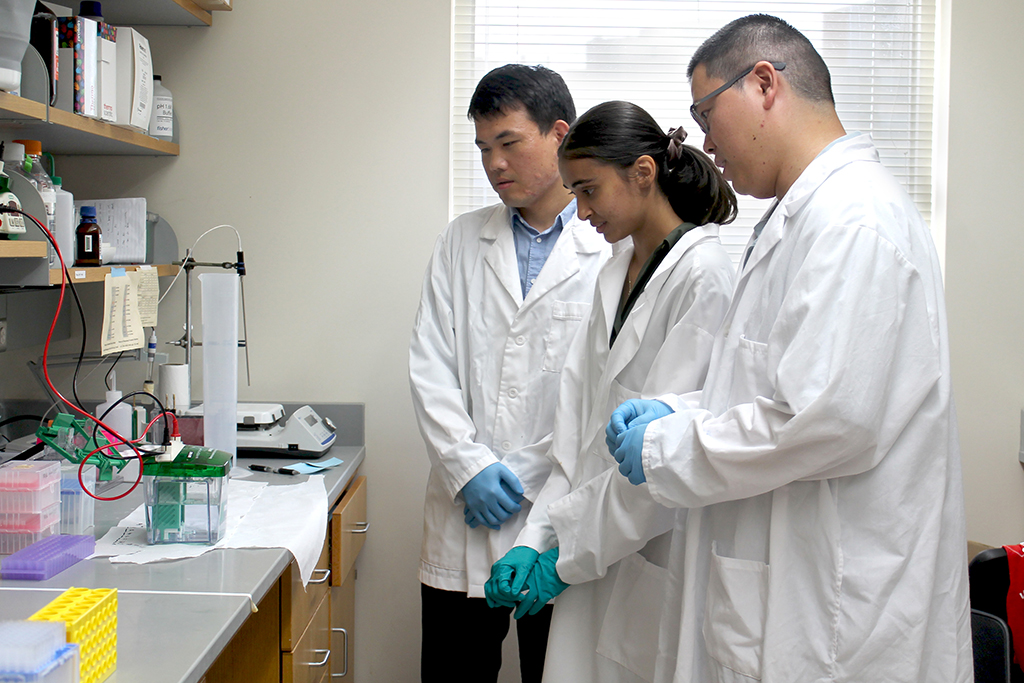
While unsure of where pharmacy school will take her, Pal hopes to continue her work with the CIPT lab for as long as possible. The funding and support of the AFPE Gateway to Research Award will help propel Pal’s research to new heights during her senior year.
Currently researching platelet treatment for an aggressive form of breast cancer, Pal is excited for her work to be applied to real patients one day and is confident that the lab’s exploration of the uncharted territories of immunotherapy will be worthwhile. The lab hopes to eventually offer a more minimally invasive treatment option while providing ease and comfort to patients.
“I want to see what can happen in the future with immunotherapy,” says Pal. “If I had the opportunity to continue my research, hopefully I can somehow make a little bit of a dent to the lab’s goals.”
Pal is planning on putting many hours of research, experimentation, and hard work into the CIPT lab next semester.
“I learned so much in the last like three years from being able to have a full-fledged research project and being able to work on really advanced stuff,” says Pal. “Every day, I’m still learning something new.”





